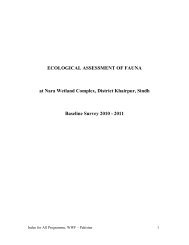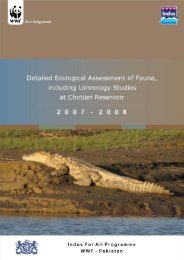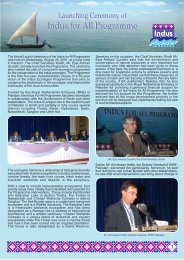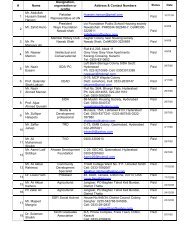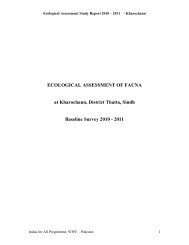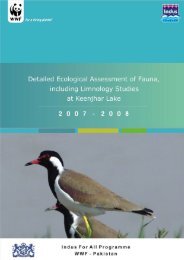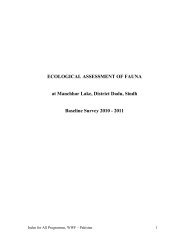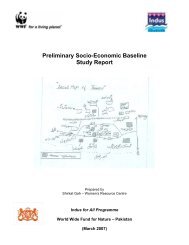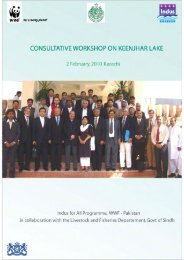Disclaimer note - WWF - Pakistan
Disclaimer note - WWF - Pakistan
Disclaimer note - WWF - Pakistan
Create successful ePaper yourself
Turn your PDF publications into a flip-book with our unique Google optimized e-Paper software.
Detailed Ecological Assessment Report 2008 – Keenjhar Lake<br />
• Increase in pollution and environmental degradation: Excessive<br />
pollution from Industries and agriculture is proving disastrous for the<br />
environmental life of this environmentally precious region. According to<br />
reports more than 2500 cusecs of left bank out fall drain (LBOD) effluent<br />
comprising poisonous pesticides residues are thrown in the Indus delta<br />
daily. Besides about 300 million gallons, urban sewerage from urban<br />
areas and about 37,000 tons of industrial waste are drained into coastal<br />
waters. This pollution is affecting marine life and ecosystem very badly.<br />
Fishing grounds coastal areas have been badly affected by industrial and<br />
urban pollution.<br />
• Lack of infrastructure: Lack of suitable infrastructure one of the key<br />
constraints to the development of the fisheries and aquaculture sectors of<br />
the country. In the context of capture marine fisheries, no landing facilities<br />
are available at major fishing centers such Keti Bunder. Similarly, road<br />
linkages are insufficient and of poor quality. Other infrastructure facilities<br />
such as communication, educational and medical facilities still lack in Keti<br />
Bunder area. Problems faced for the transformation of products from<br />
aquaculture are similar. Lack of proper freezing facilities is another<br />
obstacle in increasing the shelf-life of fish.<br />
• Post harvest losses: Post-harvest loss owing to poor handling practices,<br />
and a lack of preservation facilities on board fishing vessels and at landing<br />
centers, is some of the most important factors which result in the poor<br />
quality of raw material for processing and consumption. It is estimated that<br />
about 70 % of the harvested seafood becomes degraded or even<br />
putrefied before it reaches consumers or processing facilities.<br />
Opportunities to produce fish meal are missed as almost all by-catch from<br />
trawl fisheries is left to decompose. A similar situation prevails in the preprocessing<br />
industry where shrimps are peeled under extreme unhygienic<br />
conditions.<br />
3.5.7.2 Recommendations<br />
• Mitigating reduced flow of Indus River: which should ensure that<br />
aquaculture is closely linked to plans for investment in irrigation, irrigated<br />
agriculture and related infrastructures; establish a joint Committee<br />
composed of representatives of all Ministries dealing directly and indirectly<br />
with freshwater use, jointly engage in discussions and planning with other<br />
Ministries on priority uses, protection, sustainable development and<br />
increased productivity of freshwater resources, establish strong<br />
collaborative partnerships and processes to increase water flows in Indus<br />
River and tributaries and re-establish balanced water regimes/use,<br />
formulate policies concerning the reclamation and rehabilitation of areas<br />
affected by salinity, Monitor the impact of water diversions on habitats and<br />
livelihoods, and develop guidelines for the mitigation of negative impacts,<br />
support literacy, vocational training arid other educational programs in<br />
fishing communities; Support alternative and/or complementary livelihood<br />
activities in fishing communities through increasing access to credit and<br />
savings schemes and the provision of micro-finance initiatives. Activities<br />
should also ensure the participation of women and benefits from their<br />
involvement, in aquaculture, post-harvest and other livelihood activities,<br />
advocate for the allocation of marginal land for agricultural use to fishing<br />
communities who are affected by water diversion/limited release of water<br />
<strong>WWF</strong> <strong>Pakistan</strong> – Indus for All Programme Page 78 of 188



